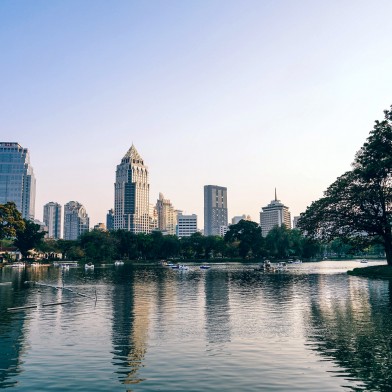From China to Vietnam, traversing six countries in total, the Mekong River is the lifeline of the many millions of people that live along it, through the provision of water, food, energy, transport, irrigation, and sanitation. As populations have grown, and as China has sought to exert greater influence in the region, management of the Mekong has become increasingly complex. New Zealand, which established the Mekong Institute with Thailand in 1996, has remained engaged in the region through the provision of various programs and activities focusing on human resource development and capacity building. In May, the Asia New Zealand Foundation and Thailand’s Institute of Security and International Studies co-convened a Track II (informal diplomacy) dialogue in Thailand to gain a first-hand understanding of the current issues impacting the Mekong region. Here are some of the New Zealand delegates’ reactions after the dialogue on why it matters to New Zealand:
Professor Siah Hwee Ang, Chair in Business in Asia, Victoria University of Wellington:
With China to the north, India to the west, and the more developed nations of ASEAN to the south, the Mekong region is located centrally in Asia, a region that will contribute significantly to global economic growth in the next three decades. The predicted GDP of the Mekong countries will be around US$4.45 trillion in 2024, an estimated 50 per cent growth from 2018 figures. It is this growth that drives the conversations among these Mekong countries in search of the region’s identity. How does the Mekong region stack beside the ASEAN Framework to avoid duplication? What kinds of dialogues will be needed to prevent a loss in translation between layers of discussions around the development of the region? What mechanisms should be created to mark the Mekong region as a regional force for external engagements beyond the region?
With rising middle income and more affluent consumers, the region represents growth potential for New Zealand’s quality products and services. New Zealand has recognised the importance of this region since the mid-1990s through its involvement in Mekong Institute. Given the exponential economic growth experienced in the Mekong region, it is also time to see more New Zealand participation in these markets.
Dr Mike Allen, executive director of Geothermal New Zealand:
New Zealand has reaped enormous benefits from its hydro system which today delivers almost 60 per cent of our annual power needs. However, the resource and environmental conservation that will limit further hydro expansion in New Zealand is being aggressively tested along the Mekong. The river is the lifeblood for millions and increased attention is being focused on its health and wellbeing as population growth, resettlement and the associated demand for electric power places growing pressures on the river and is resources.
The headwaters in Yunnan in China have already seen two major hydro developments — almost 8000 MW in combined capacity — and along the Mekong and its tributaries, as it winds through Cambodia, Laos, Myanmar, Thailand and Vietnam, over 200 additional developments are being contemplated or under construction.
Sharing the resources of the Mekong across the countries of the Greater Mekong Subregion (GMS) is creating enormous challenges. While New Zealand helped establish the Mekong Institute almost 25 years ago to address regional development, good governance, trade and investment, the management of the Mekong River is now being debated across more than a dozen agencies. The influence of China, with its associated Belt and Road Initiative strategy, is clearly apparent in many countries as they each seek to secure their share of the river and its resources and build the infrastructure to extract much-needed power.
This may all seem a little remote from New Zealand and its interests, but we have a global responsibility to help ensure that natural resources are protected into the future, and we have energy expertise and know-how that might help others. The challenges the GMS faces in managing the Mekong River are offering sobering perspectives on meeting future electricity needs and we can hopefully work with those in the region offering best practices and helping the consideration of clean, non-hydro alternatives.
Jenny Chu, co-founder of Engineers Without Borders New Zealand:
Mekong, as the heart of ASEAN, matters greatly to New Zealand because it presents many complex multilateral opportunities and challenges not only to the ASEAN region but the greater Asia-Pacific or Indo-Pacific ecosystem, which we are both part of.
Just as we are linked by mountains and seas, Mekong and New Zealand also face similar challenges such as seismic activity, increasing prevalence of drought, intense rain fall events, flooding and storm surge, all of which have consequences on our agriculture, livestock and food security sector as well as our environment, natural resources and biodiversity. These environmental constraints present common challenges to engineers in our countries when planning and delivering infrastructure works.
The diverse and extensive water system of the Mekong River covers multiple countries and supports millions of people, and is the heart of the Mekong region's economic growth. The big test for the region now is the pathway to realise its development ambition in a sustainable and coordinated manner, addressing issues such as the cross-boundary impacts associated with land and infrastructure development adjacent to the riverbank and the increasing dam construction in Mekong. Perhaps parallels can be drawn between the future of Mekong and the two remarkable developments in environmental law recognising the Ganges and the Yamuna rivers in India as well as Whanganui River in New Zealand as living entities, all have been revered by riparian communities down the ages?
Jordan King, PhD candidate at the School of Social Sciences, University of Auckland:
New Zealand has strong development, economic, and people-to-people connections across the Mekong countries. We have an interest in a prosperous, peaceful, and sustainable future for the region. However, the future of the region is currently uncertain. Mekong countries are facing three clear challenges.
The first is on the future of the Mekong River. New hydroelectricity projects, many responding to China's expanding energy needs, will make worse the ecological and social harms already faced by Mekong communities. On the current path, countries' energy expansion goals aren't accounting for the significant pressure new development will put on the environment and local communities. Damming is placing fish stocks at risk in a region dependent on fisheries for food and employment of millions. It's uncertain whether a plan to manage these challenges can realistically come together.
The second area of uncertainty is in Mekong regional politics. There are a number of organisations competing for the power to make policy on future Mekong River developments. Geography has dealt a powerful hand to some in the competition. Downstream countries will struggle for leverage because many proposed 'mega-dam' projects will be built upstream in China and Laos.
Great power competition is a third challenge. The US and China have differing visions for the future of the region. China's Belt and Road Initiative, a major infrastructure project designed to move goods in and out of China with ease, is investing heavily in the region. High speed rail from China to Singapore is one key project. The US doesn't want China calling the shots in the region and is developing its 'Indo-Pacific strategy' to rival China. It is currently unclear what US initiatives are planned for countries along the Mekong, but it is clear they will face a difficult dance between the two powers.
What happens with these issues in the Mekong will have implications far beyond the region. The prioritisation of environmental and social protections in the Mekong would create a powerful international standard. If meaningful resource management takes hold there will be greater hope for sustainability. If countries active in the region commit to shared rules and robust protections for both sustainable development and rules-based trading life will be easier, especially for small trading nations at the bottom of the world.
- Asia Media Centre



